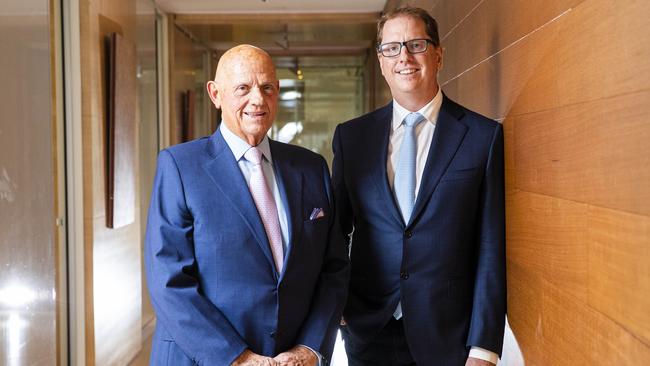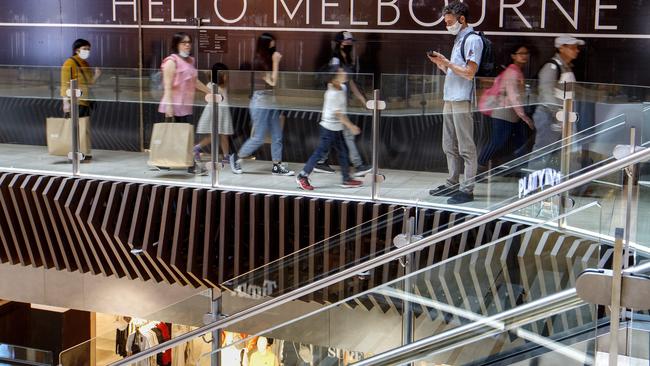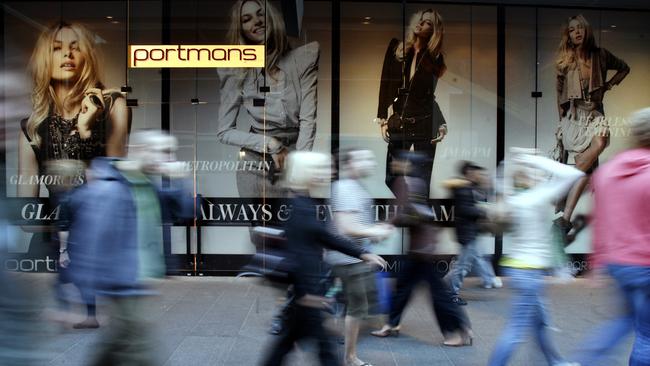Billionaire Solomon Lew wants temperature and vaccine checks at shopping centre entrances
Solomon Lew has let loose one of his characteristically wounding attacks on the nation’s powerful shopping centre landlords.

Solomon Lew has let loose one of his characteristically wounding attacks on the nation’s powerful shopping centre landlords, this time warning consumers will avoid their centres unless there are vaccine and temperature checks at mall entrances with the billionaire admitting he wouldn’t feel safe sitting in a food court without Covid checks at the door.
Taking a break from his usual routine of savaging shopping centres for exorbitant rents charged to his retail businesses – although the Premier Investments chairman did argue it was their responsibility to pay for Covid-19 monitoring – he said shopping centre owners had an “absolute responsibility” to ensure the safety of shoppers and store staff.
“First of all we need to protect our customers and you need to make it a safe place to shop, families are coming, mum, dad, the kids, grandparents coming into a big seasonal shopping time,” Mr Lew said after Premier Investments unveiled an almost doubling of its annual profit to $271.8 million at a time when pandemic lockdowns and shuttered stores caused havoc in the retail sector.

Setting it apart from many other retailers, Premier Investments also ended fiscal 2021 with a bulging war chest of cash, sitting at $523.3m, as well as a $1.2 billion equity stake in kitchen appliances business Breville Group.
And where economies were reopening, such as in Britain and Ireland, and children were going back to school its stationery chain Smiggle was enjoying booming sales.
But in Australia, the Premier Investments chairman has witnessed the threat to retail first hand from nationwide lockdowns with Premier Investments’s portfolio of retail stores that include Peter Alexander, Smiggle and Just Jeans, racking up 50,581 lost retail store trading days during 2021.
Now with non-essential retail ready to open, he wants the tens of millions of shoppers that visit malls – and where 90 per cent of his retail stores are located – to be vaccinated before they enter and for the landlords to take the lead on monitoring this.
“The mall owners have to take more responsibility, they are the ones that are letting people into centres so at the entry point there should be a check, they have to be safe.
“Our strong preference is with the government mandate, is that with all persons entering the (shopping) mall be vaccinated and checked for temperature as well and that should take place at the point of access.
“The centre owners have an absolute responsibility to ensure the venues are not only safe for the entire family for the shopping experience but they ensure our retail staff will have nothing to fear from trying to earn a living working in retail stores,” Mr Lew said.
“That’s why I use the analogy, I’m not sure if I would go into sit in a food court and without knowing everybody there (is checked) so that I’m in a safe place.”
It puts Mr Lew, Premier Investments and his new chief executive, former JB Hi-Fi boss Richard Murray, into possible heated conflict with the shopping centre landlords like Westfield, Scentre and Vicinity as they begin to open up the economy in New South Wales and Victoria.
Shopping centre owners fired back at the proposals on Thursday, pointing to their role in providing essential services, including medical facilities, to which people need to access.
Mall owners have argued that unvaccinated people will not be treated differently under the national road map and also require access to major essential retailers like Coles and Woolworths and pharmacies.
“Shopping centres have remained open throughout the Covid-19 pandemic as public places and to enable the community’s safe access to retailers and services such as supermarkets, pharmacies, medical clinics, allied health, and food and grocery outlets,” Shopping Centre Council of Australia executive director Angus Nardi said.
“Throughout the pandemic, we have continued to have detailed discussions with governments, public health experts, and compliance agencies to ensure we are meeting and exceeding expectations for Covid safety across our centres,” Mr Nardi said.
Most centres have put in place some precautions like hand sanitiser and digital check-ins but they have argued that stopping unvaccinated people from entering malls would not be feasible as some have as many as 30 entrances, including from roads and laneways.
“The industry is well prepared to welcome the community back to shopping centres as lockdowns lift and shoppers and retailers gear up for the Christmas season,” he added.
Retailers might be able to reopen New South Wales as early as the second week of October, with Victoria to follow later that month, if vaccination targets are met.
“That’s 19 days away,” said new Premier Retail CEO Mr Murray. “We are in full swing prepping for that, but in fairness to staff and customers we need to understand how we will navigate a world of vaccines.”

Mr Lew said the government needed to step in and ensure the shopping mall and centre owners made their venues safe for the return of shoppers and retail staff.
“It is really for government to get together with the mall owners and say, listen here fellas,
this is how it is going to work, people have to be vaccinated and people have to be temperature checked.
“Once they are in the mall and they are checked at the point of entry then there is no issue for stores as such.”
This would also avoid the inconvenience and cost of each individual store within a shopping centre operating their own vaccination and health checks.
The businessman, whose Premier Investments owns a portfolio of retail chains such as Portmans, Just Jeans, Dotti, Peter Alexander and Smiggle, warned shopping malls that before Covid-19 were a hive of shopping activity needed to listen to the businesses that paid their bills – the retail tenants.
“Who is paying them? Without the stores the shopping malls have got nothing,” said Mr Lew.
It comes as Premier Investments once again proved its retail muscle through the pandemic, with Mr Lew commenting that his retail empire had “not only survived but thrived”.
Premier Investments’s full-year net profit rose 97.3 per cent to $271.8m while sales at its core Premier Retail arm lifted 18.7 per cent to $1.4bn
And Premier Investments wouldn’t be skimping on inventory to ensure it was ready for a shopping spree by consumers heading into Christmas, ordering early to land stock as summer and Christmas approaches.
“Premier Retail has again made the strategic decision to invest in inventory and we have the appropriate supply chains to support this decision and ensure we are in stock of wanted product,” Mr Lew said.
Although with much of Victoria and New South Wales and parts of New Zealand in continued lockdowns, Premier Investments said for the first seven weeks of fiscal 2022 total global sales were down 9.5 per cent.
The company said global like for like sales were up 15.9 per cent led by record Peter Alexander sales of $388.2m, up $100m, or 34.7 per cent. It also posted record online sales of $300.7m, up 36.4 per cent.
Premier Investments declared a final fully franked dividend of 46 cents per share, up 10 cents per share, taking full year dividends to 80 cents per share. The final dividend will be delayed in terms of payment date, with it paid on January 27.
Shares in Premier Investments ended up 82 cents at $27.63.




To join the conversation, please log in. Don't have an account? Register
Join the conversation, you are commenting as Logout